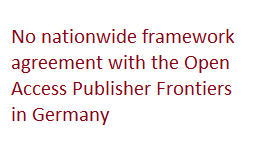No agreement with Frontiers in Germany
As Bernhard Mittermaier, head of the central library of the Forschungszentrum Jülich, announced yesterday, there will be no agreement with Frontiers in Germany. The negotiations between the Forschungszentrum Jülich and the Open Access Publisher Frontiers on a nationwide framework contract did not succeed.
In his message (in German language, translated for this posting) he states: The “publishing house Frontiers Media SA and the Central Library of Forschungszentrum Jülich (…) have been negotiating a Germany-wide consortium for Frontiers’ journals since autumn 2018. In February 2020, a Memorandum of Understanding (MoU) was signed, which contained the status of the negotiations, the points still outstanding, and a timetable for concluding a contract. Potential participating institutions were asked for feedback on the MoU by the end of June 2020. The feedback focused on the criticism of the abolition of an APC cap, which is currently in place in many cases. Frontiers, however, was not willing to continue such a cap. (…)
In view of these developments, Frontiers and Forschungszentrum Jülich have worked together on a new model for financing open access publications at Frontiers. Unfortunately, no final agreement could be reached on this, so it was jointly decided to terminate the negotiations.”

The criticism
The criticism on the planned agreement with the Open Access Publisher Frontiers in Germany stemmed from the fact that many German universities and universities of applied sciences have set up Open Access funds funded by the German Research Foundation (Deutsche Forschungsgemeinschaft DFG) in its program Open Access Publizieren, which reimburse APCs in Gold Open Access Journals up to a maximum of €2000 gross. Many libraries regard this limit as a suitable means of not overburdening their Open Access budget and see it as an opportunity to slow down the price increase of APCs. Two examples of the criticism of the planned Frontiers agreement mentioned by Mr. Mittermaier can be found online, one by Thomas Krichl and one by Michael Wohlgemuth.
The key points of the Memorandum

In February this year Frontiers outlined the key points of the aimed for agreement as follows: “Specifically, the two parties have agreed:
- Researchers from participating institutions will be able to publish in any of Frontiers’ open access journals (currently 79), which includes more than 662 academic disciplines.
- The publication costs (Article Processing Charges, or APCs) of eligible articles from those researchers will be covered by the respective central libraries or departments of participating institutions.
- Articles will be published under an open license (CC-BY) allowing authors and their institutions the right to retain copyright.
- German institutions will benefit from Frontiers’ institutional collaboration programme which provides dedicated workflows, support and transparent reporting on an institutional as well as national level.
- The Helmholtz Centres will be the first participating institutions under the Framework and will commit to fund the publication costs, estimated to be a total of US$ 2 Million, for their scientists over the next three years.
- As part of the pilot, a new payment mechanism will be tested with the Helmholtz Centres. It aims to simplify budget planning and administrative costs for libraries. Additionally, a transitional solution is to be found for German institutions that depend on DFG funding and are current member of Frontiers’ institutional membership programme.
- All participating institutions will benefit from a national discount.”
Open Access transformation is facing the price question
In view of the cost discussion surrounding the German DEAL contracts and the fact that there will be no agreement with Frontiers in Germany, the planned Open Access transformation is facing the price question at the end of 2020. The DEAL project at least, which was launched with the aim of buying the publishing portfolios of Elsevier, Springer Nature, and Wiley free for Open Access and thereby saving costs, removed the statement on cost savings from its website: “Durch die Effekte eines Konsortialvertrages auf Bundesebene sollen die einzelnen Einrichtungen finanziell entlastet und der Zugang zu wissenschaftlicher Literatur für die Wissenschaft auf breiter und nachhaltiger Ebene verbessert werden.” Or in English language: “The effects of a consortium agreement at the federal level should relieve the individual institutions financially and improve access to scientific literature for science on a broad and sustainable level.” This passage was still on the DEAL website in 2017, whereas it is no longer there today.

Graduate sociologist, information scientist (PhD degree), associate of scidecode science consulting – De Castro, Herb, Rothfritz GbR, working for the Saarland University and State Library (Germany)
